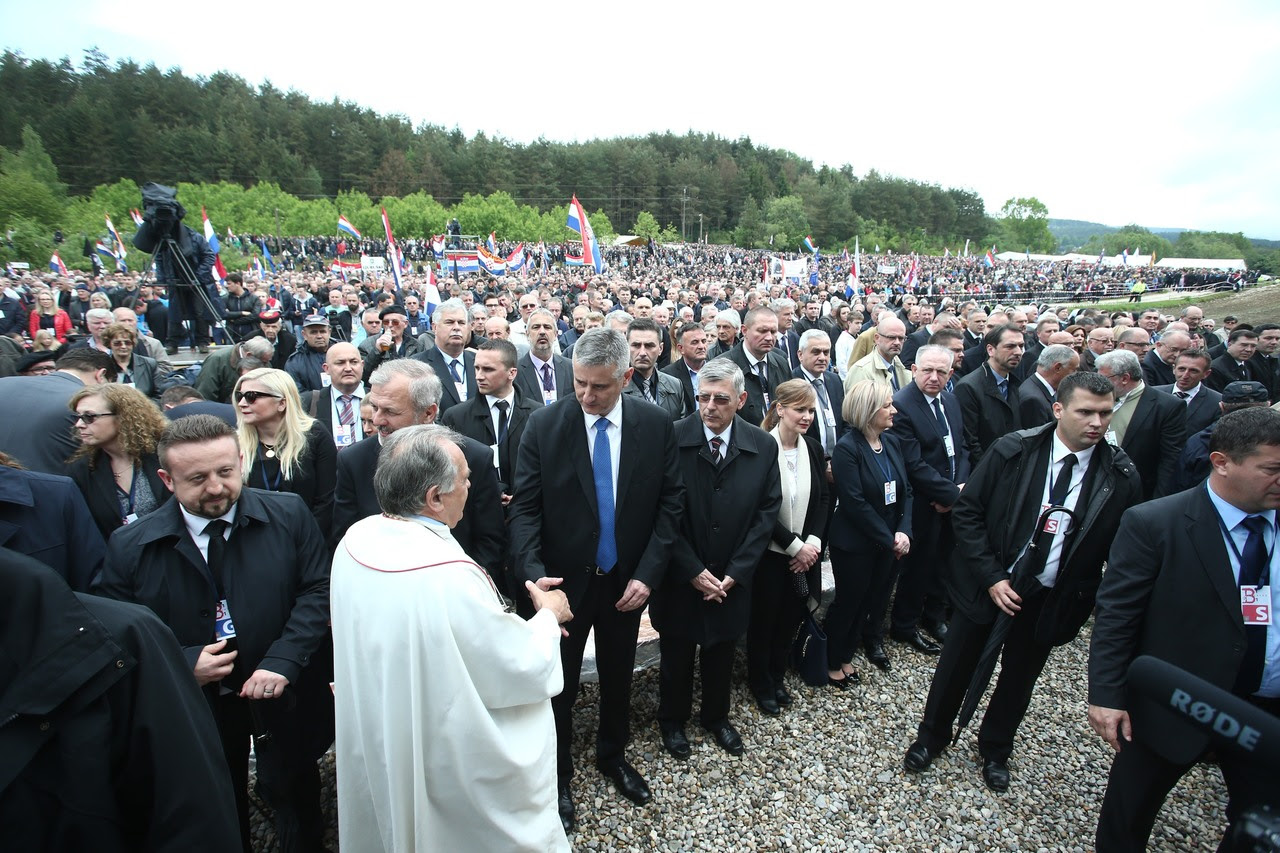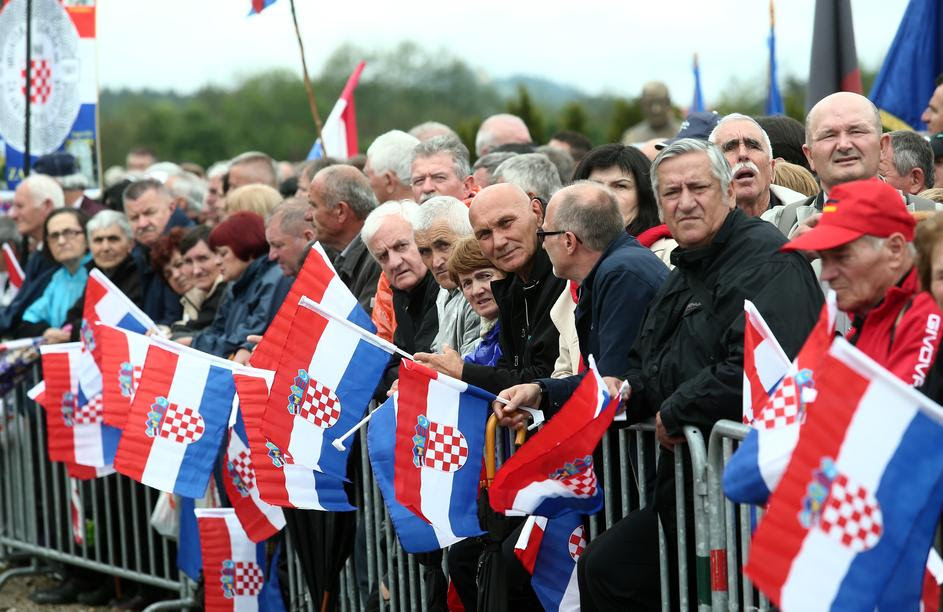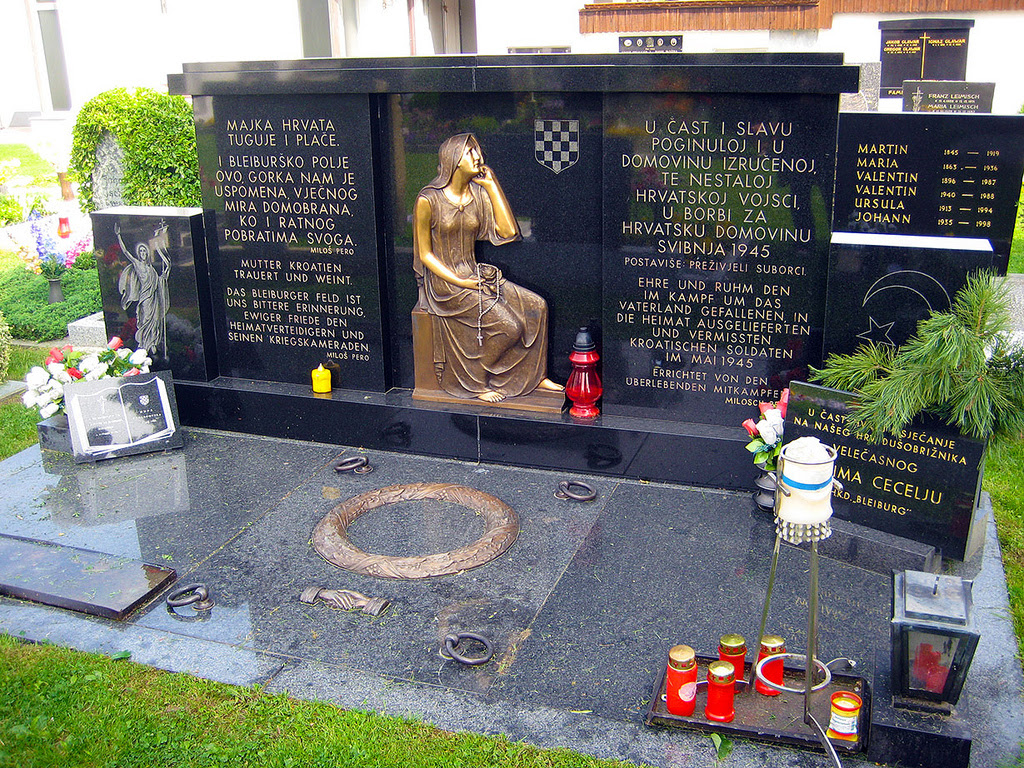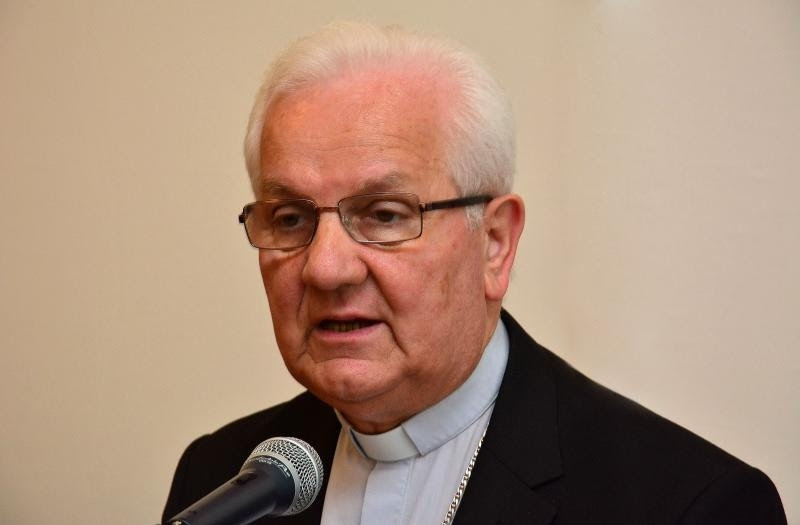
Tomislav Karamarko, First Deputy Prime Minister
Shakes hand with one of the clerical officials leading the mass at Bleiburg field Saturday 14 May 2016 Photo: Sanjin Strukic/Pxsell
The 71st annual commemoration of Croatian victims of communism (Yugoslav) at the Bleiburg field, Austria, and along the Way of the Cross from mid-May 1945 to months after, took place under the renewed auspices of the Croatian Parliament at Bleiburg field on Saturday 14 May 2016. TheEucharist led by Bishop Franjo Komarica (From Banja Luka/ Bosnia and Herzegovina) embraced the compassionate and grieving hearts of more than 20,000 Croats and their guests.
The Bleiburg field and death marches (Way of the Cross) symbolise thetragedy of the Croatian people that occurred after WWII had ended. Thetotalitarian communist regime of Yugoslavia then committed acts of horrendous violence on massive scales, violating basic human rights, including the most valuable human right - the right to life. All this, in thename of sick revenge and political agenda, which would see the undisturbed installation of communism as the only way of political thought and deed for decades to come.
Zeljko Reiner, the President of the Parliament, Deputy Prime Minister Tomislav Karamarko (who also led a delegation on the same day to lay wreaths at the Tezno pit – mass grave filled with more than 15,000 victims of communist crimes), several ministers and MPs gathered there to personally bow their heads to the victims. Prime Minister Tihomir Oreskovic, President Kolinda Grabar-Kitarovic, and Deputy Prime Minister Bozo Petrov were not there with the masses on Saturday (although President Graba-Kitarovic did send a representative Bruna Esih), they each decided to avoid coming on that day but did get to Bleiburg privately or on the quiet the day or so before.
This seems to be some sort of a new fashion or a fad in Croatia from theoffice of the President and Prime Minister: not joining the official commemoration, not joining the people for the occasion – just going separately under the explanation that they do not want to bring politics into commemorating! Similar thing occurred for the commemorations of theHolocaust in Jasenovac in April, at least as far as the President is concerned.
Well, while politics should not interfere with commemorations for victims of these brutal crimes it does strike one that the very noticeable President’s and Prime Minister’s absence actually makes that choice of theirs very political. The President’s eye-poking purposeful absence from the official memorial ceremonies does colour commemorating the victims political no matter what the President or Prime Minister say. By not attending the official ceremonies, to my view, both the President and the Prime Minister have given their nod of approval to the Social Democrats/ the left parliamentary opposition for their absence from the official commemorations! So, thePresident's and the Prime Minister's calling for unity does not sit comfortably when in fact they practice separatism in this very important historic event forthe Croatian nation.
“A major problem in modern historiography is that when describing the‘struggle for historical remembrance,’ not all victims enjoy the same privilege of commemoration. Judging by the modern media body counts, someone’s World War II dead must have priority, while someone else’s dead are meant to slide into oblivion. In Croatian historical awareness the word ‘Bleiburg’ has a special meaning, just like the word ‘Viktring’ has a specific meaning for the Slovenes and for the inhabitants of Austria’s Carinthia. Indeed, in theCroatian language the word ‘Bleiburg,’ does not evoke the images of pristine woods, skiing holidays, or a new shopping center. For many Croatsthis word has become a metaphysical locution designating a horrific example of catastrophically failed nation-state building. Bleiburg is not a symbol of a picturesque and romantic location, but a road sign of Croatia’s sociobiological catastrophe. By the late May 1945, hundreds of thousands of fleeing Croats … were extradited from there to Tito’s Yugoslav partisans—courtesy of the Allied English troops in the vicinity,” wrote recently dr Tom Sunic in his review of Florian Thomas Rulitz’s book “The Tragedy of Bleiburg and Viktring, 1945.
During communist Yugoslavia, the commemorations at both Bleiburg and Jasenovac were illustrative of how Josip Broz Tito’s communist dictatorship monopolised the historical narrative through public rituals. Under Tito’s – communists’ directives - the commemoration at Jasenovac (symbol of theHolocaust) served to uplift in people’s eyes and legitimate the ruling communist party, and any questioning of the official narrative or figures was strictly forbidden. Numbers of victims at Jasenovac were blown out of reality and floundered falsely, without questioning, into hundreds of thousands just because psychologically the greater the number the more horrible the crime in people’s minds. Bleiburg, on the other hand, was a taboo topic, banned and systematically erased from the cultural and historical memory in Yugoslavia, but was kept alive in the Croatian diaspora community and its press.
In contrast to the state-sponsored rituals at Jasenovac, individuals paying homage to the victims at Bleiburg and its aftermath often did so at great risk to their lives – the first commemoration in Bleiburg occurred in 1952, All Saints Day, when three survivors laid a wreath at the graves of Croatiansoldiers in the Unter-Loibach cemetery. As attendance of thecommemoration grew over the following few years, held annually on Mother’s Day, Yugoslav intelligence agents began monitoring, threatening, and killing Croatian émigrés involved with the Bleiburg ceremony. Communist Yugoslavia Secret Police/UDBA operating internationally hunted down their Croat political opponents with beastly brutality.
“The atrocities and mass murders committed by Josip Broz Tito’s Partisan units of the Yugoslav Army immediately after the Second World War had no place in the conscience of Socialist Yugoslavia. More than once, the annualCroatian commemoration of the Bleiburg victims was subject to attacks carried out by the socialist Yugoslav state. Abroad in the West, on Austrian soil, the Yugoslav secret service (UDBA) did not shy away from murderingthe protagonist of the Croatian memory culture, Nicola Martinovic, as late as 1975. The official history was aligned with a firm interpretational paradigm that called for a glorification of the anti-fascist ‘people’s liberation resistance.’ With the breakup of Yugoslavia and its socialist regime in 1991,the identity-establishing accounts of contemporary witnesses, which had mainly been cherished in exile circles abroad, increasingly reached public awareness in Croatia and Slovenia.
In the 1990s Croatia witnessed the emergence of a memory that had been suppressed by the socialist-Yugoslav regime—namely the Bleiburg tragedy.The situation in Slovenia was similar in terms of identity and remembrance culture... Reports on the communist postwar crimes and on the countless discoveries of mass gravesites have also begun circulating in the media ofthe German-speaking world in the last few years…” part of foreword to theEnglish translation of the book by Florian Thomas Rulitz, “The Tragedy of Bleiburg and Viktring 1945”
 The collapse of communism, the 1990’s war in Croatia, and the post-warefforts at reconciliation and EU integration all contributed to the public changes in the meanings, symbolism, and political significance of thecommemorative events at Bleiburg. The annual gathering at Bleiburg Field transformed from an illegal commemoration attended largely by émigrés into a commemoration of victims of communist crimes and a proud symbol for all Croats who had sacrificed themselves for the freedom and independence of the Croatian state.
In 1990, on the 45th anniversary of the Bleiburg massacre, the Croatianmedia reported on the commemoration at Bleiburg for the first time inCroatia, but such reporting, especially the left-leaning media, has often continued with utter brutally untruthful allegations against innocent victims, often miserably implying they (or many of them) deserved death even if they were not ever tried in court or found guilty, fueling international media to dothe same. That's the talk of executioners who do not want to bear any guilt for their crimes that sadly still lingers strongly, preventing the victims to rest in dignified peace they truly deserve.

Tomislav Karamarko, First Deputy Prime Minister (front left)
and Zeljko Reiner (front right) President of Croatian Parliament Pay respects to victims of communist crimes at Bleiburg Saturday 14 May 2016 Photo: Vlada RH/Twitter So, amidst all the politicking and media "cannibalism" let’s remind ourselves:
“What has actually happened on the 15th of May 1945, the day of thesurrender? When after the laying down of the weapons Tito's partisans were certain that their victims (Croatian army) could no longer defend themselves and that the British did not intend to intervene (the British, namely, threatened that they would bombard the Croatian troops and civilians if the Croats did not immediately lay down their arms), the partisan commissioner Milan Basta, a Serb from Lika, issued his order. Only those who were present at that apocalyptic massacre could describe what thereupon followed. Here is the testimony of one eyewitness. "Men, women and children were falling down in sheaves while the partisans were mowing left and right with their machine guns over the open field. Soon so many people were slaughtered that the partisans ventured to descend among thesurvivors and with visible pleasure to beat them to death, to kick them with boots and to stab them with bayonets." (Report of the eyewitness Ted Pavić in Nikolaj Tolstoy's book "The Minister and the Massacres", London 1986, p. 104). Another eyewitness Jure Raguz reports, that in his vicinity he saw a desperate Croatian officer shoot his two small children, a boy and a girl, then his wife and in the end himself (quoted on the above indicated page). When the slaughter at Bleiburg was finished on the 16th of May, theremaining mass of disarmed and frightened Croatian prisoners was driven on foot into Yugoslavia, to the blood-fields of Kočevski Rog and others further on, on a death march known as the ‘Way of the Cross’. A Slovenian Franc Perme in his documentary book ‘Concealed graves and their victims’ proves, that in the first days after the end of the Second World War, only within the area of Slovenia, therefore outside of Austrian Bleiburg, further189,000 Croats were killed, and further 144,500 died in the death columns on the Way of the Cross from the Slovenian-Croatian border to theRomanian border…”
In his homily, Bishop Komarica said that Bleiburg is the most prominent symbol of totalitarianism and ideologies that have humiliated and disgraced human dignity of humanity - terribly and deeply; shamelessly trampling upon human dignity, rights and freedoms and destroying a man's sense of co-responsibility and moral and ethical values. Lest we forget! Ina Vukic, Prof. (Zgb); B.A., M.A.Ps. (Syd)
|
يسوع المسيح هو الطريق والحق والحياة. وساقوا يسوع إلى رئيس الكهنة. فاجتمع إليه جميع رؤساء الكهنة والشيوخ والكتبة. وتبعه بطرس من بعيد إلى داخل دار رئيس الكهنة، وكان جالسا مع الحراس يستدفيء عند النار. وأخذ رؤساء الكهنة والمجلس الأعلى كله يبحثون عن شهادة على يسوع ليقتلوه، فلم يجدوا. فقد شهد كثيرون عليه زورا، ولكن شهاداتهم كانت متناقضة.
četvrtak, 19. svibnja 2016.
Bleiburg – Commemorating CroatianVictims Of Communist Crimes
Pretplati se na:
Objavi komentare (Atom)







Nema komentara:
Objavi komentar